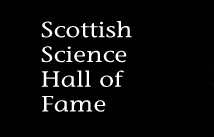James Clerk Maxwell (1831-1879)
James Clerk-Maxwell : [obituary]
336
Proceedings of the Royal Society
“ For his Researches on the Composition of Colours, and other
optical papers.” Though a triplicity about colour had long been
known or suspected, which Young had (most probably correctly)
attributed to the existence of three sensations, and Brewster had
erroneously* supposed to be objective, Maxwell was the first to
make colour-sensation the subject of actual measurement. He proved
experimentally that any colour C (given in intensity of illumination
as well as in character) may be expressed in terms of three arbitrarily
chosen standard colours, X, Y, Z, by the formula
C = aX + bY + cZ.
Here a, b, c are numerical coefficients, which may be positive or
negative; the sign = means “matches,” + means “superposed,”
and – directs the term to be taken to the other side of the
equation.
The last of his greatest investigations bore on the Kinetic
Theory of Gases. Originating with D. Bernoulli, this theory was
advanced by the successive labours of Herapath, Joule, and particu-
larly of Clausius, to such an extent as to put its general accuracy
beyond a doubt. But by far the greatest developments it has
received are due to Maxwell, part of whose mathematical work has
recently been still further extended in some directions by Boltzmann.
In this field Maxwell appears as an experimenter (on the laws of
gaseous friction) as well as a mathematician. His two latest
papers deal with this branch of physics; one is an extension
and simplification of some of Boltzmann’s chief results, the other
treats of the kinetic theory as applied to the motion of the radio-
meter.
He has written an admirable text-book of the “ Theory of Heat,”
which has already gone through several editions, and a very excel-
lent elementary treatise on “Matter and Motion.” (See, again,
“Nature,” vol. xvi. p. 119.) Even this, like his other and larger
works, is full of valuable matter, worthy of the most attentive
perusal not of students alone but of the very foremost scientific
men.
* All we can positivly say to be erroneous is some of the principal argu-
ments by which Brewster’s view was maintained, for the subjective character
of the triplicity has not been absolutely demonstrated.

![James Clerk-Maxwell : [obituary] - Page 336](https://deriv.nls.uk/dcn4/7449/74491730.4.jpg)
